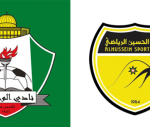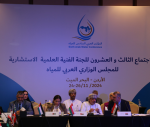You are here
Water — imperative for development and security
Sep 20,2016 - Last updated at Sep 20,2016
A few weeks ago, the world’s largest annual global water policy meeting, the World Water Week (www.worldwaterweek.org), was held in Stockholm, for the 26th consecutive time.
It gathered over 3,000 participants from well over 120 countries. The focus of the week was on “Water and sustainable growth”.
The World Water Week, organised by the Stockholm International Water Institute, is one of many manifestations of the global commitment that Sweden has to raising the attention of, as well as seeking solutions to, the global water crisis.
Today, when much of the attention is focused on the immediate threats to security and peace, we would like to highlight a key vulnerability that cannot be overshadowed by the more direct threats.
The Middle East and North Africa (MENA) region is the most water scarce country in the world. Jordan is ranked as the fourth most water scarce country globally, and with the ongoing refugee crisis, the country suffers even more challenges relating to its water resources.
It is estimated that over 60 million people lack access to drinking water of an acceptable quality and over 70 million people lack access to adequate sanitation in the MENA region.
Water resources are often shared by two or more nations, and there is a heavy reliance on groundwater resources.
Climate change is here and will act as a multiplier of already existing stresses, and further affect water availability and quality.
It is critical that the international community focus on water, and Sweden is trying to take a lead to meet these challenges.
For long, Sweden has allocated significant support to water and sanitation at global and regional levels, but also focused work on supporting “integrated water resources management” as well as supporting improved cooperation over shared water resources.
Sweden is among the leaders in the work to implement the recently adopted Sustainable Development Goals and drives the 2030 agenda forward.
One expression of this commitment in the MENA region is the recently adopted strategy for development cooperation with the MENA region in which support to water is a key priority.
Sweden will spend well over $10 million annually on supporting regional water initiatives, thereby continuing to champion the work on regional waters in the region.
The World Water Week this year, for the first time, had a dedicated MENA focus day, a recognition of the challenges water issues face in the region.
Among others, our partner EcoPeace Middle East, which is a joint Israeli, Jordanian and Palestinian NGO that is pioneering bottom-up approaches for cross-border cooperation around the Jordan River basin, presented ambitious and visionary plans for what a development in the basin could look like with more cooperation among countries sharing the river.
Another example is the UNESCWA-implemented programme, which has pioneered approaches for achieving the MDG 7, with a focus on water.
By doing so the programme now functions as a model for the UN system when it seeks good indicators to measure progress on water and sanitation globally.
Trans-boundary water, which is water that is shared by two or more countries, still suffers from lack of sufficient attention.
This is the situation in spite of the fact that over 50 per cent of the available freshwater globally is of a trans-boundary nature.
In the MENA region, the majority of water is trans-boundary. In a situation of scarcity, this leads to complex challenges in which security considerations are of key importance.
Achieving cooperation on trans-boundary water bodies such as the Jordan River or the Euphrates-Tigris is of utmost importance in the long run, both for development and water security.
In the case of the Jordan River, Sweden holds the view that more equitable and fair sharing is imperative.
The river’s importance to Jordanians, Palestinians and Israelis leaves the respective governments with little choice but to act.
Our support to EcoPeace Middle East, which has shown that cooperation across borders is possible in spite of the conflicts over water, is a case in point.
Its “Water cannot wait” campaign, arguing that the water question between Israel and Palestine needs to be solved, points to the urgency of agreeing on the water issue even if progress on overall negotiations is not achieved.
Another key aspect of Swedish perspectives relate to equality, and in particular gender equality.
Sweden’s feminist foreign policy will guide our work also when it comes to water.
Water is about equality. Equality between men and women, between urban and rural, and between nations.
From a water perspective, the responsibility often falls heavily on women and girls. More often than men, women and girls have to carry water to the household, as well as manage water in the household.
Time spent on fetching water means less time spent on education and formal work. Thus, unpaid jobs tend to stay with women and girls rather than with men and boys.
Still, most water-related decisions — at household, community, national and international level — are taken by men. Women’s rights, representation and resources need to be acknowledged and addressed for social inclusion and sustainable development.
In conclusion, Sweden and the Swedish embassy will continue to push for sensible and sound approaches for improved water management in the region, including increased cooperation, adequate representation as well as equitable and fair outcomes.
Erik Ullenhag is the ambassador of Sweden to Jordan. Anders Jägerskog is counsellor and regional water adviser at the embassy of Sweden in Jordan. They contributed this article to The Jordan Times.












